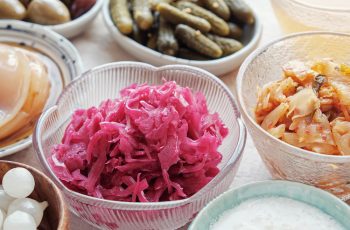Ad Blocker Detected
Our website is made possible by displaying online advertisements to our visitors. Please consider supporting us by disabling your ad blocker.
Taking care of your gut may seem challenging, but it can be as simple as choosing the right foods. Studies show that a healthy gut benefits your mental state, immune system, and even your weight. Here’s a list of foods and tips that can make a positive impact on your gut health.
High Fibre Foods: The Gut’s Best Friend
According to the Physician’s Committee for Responsible Medicine (PCRM), a high fibre diet supports healthy gut bacteria. Foods like whole grains, fruits, and vegetables are full of fibre that your gut flora can ferment into short-chain fatty acids.
Fatty chain acids, such as omega-3 and omega-6 fatty acids, can enhance the health benefits of a diverse gut in a number of ways:
- They promote the growth of beneficial gut bacteria. Fatty chain acids are a preferred food source for many beneficial gut bacteria, such as Bifidobacteria and Lactobacilli. These bacteria produce a variety of beneficial compounds, including short-chain fatty acids (SCFAs), which are essential for gut health.
- They reduce inflammation. Fatty chain acids have anti-inflammatory properties, which can help to reduce gut inflammation. This is important, as chronic gut inflammation is linked to a number of health problems, including inflammatory bowel disease, colorectal cancer, and cardiovascular disease.
- They strengthen the gut barrier. The gut barrier is a thin layer of cells that separates the gut from the rest of the body. It prevents harmful bacteria and toxins from entering the bloodstream. Fatty chain acids can help to strengthen the gut barrier, making it less permeable.
- They improve immune function. The gut plays a vital role in the immune system. Fatty chain acids can help to improve immune function by boosting the production of immune cells and antibodies.
Fermented Foods: Probiotic Powerhouses
Fermented foods like yogurt, sauerkraut, and kombucha are rich in probiotics. These probiotics are essentially good bacteria that help maintain a balanced gut microbiome. Food Revolution and Mind Body Green suggest that including fermented foods in your diet can offer long-term benefits for your digestive system.
Spices, Onion, and Garlic: Nature’s Antibiotics
Onions and garlic are natural sources of prebiotic foods that encourage the growth of healthy gut bacteria. They are not only tasty additions to your meals but also help in maintaining a balanced gut flora. According to Healthline, these foods also possess anti-inflammatory properties that reduce inflammation in the digestive system.
Green Tea: More than Just a Beverage
Green tea is more than just a drink. It’s rich in antioxidants that support weight loss and mental health. The catechins in green tea serve as powerful antioxidants that play a role in weight loss and mental health. Additionally, Healthline suggests that green tea can also contribute to a healthy gut by promoting the growth of good bacteria.
Exercise Caution: Foods to Avoid
Just as some foods contribute positively to gut health, some can harm it. Foods high in sugar and fats are detrimental, as outlined by Healthline and Eating Well. They can cause an imbalance in the gut microbiome, leading to digestive issues and reduced immune function.
Gut Health and Weight Loss: The Connection
A balanced gut can make your weight loss journey easier. According to Body and Soul, foods that foster a healthy gut also tend to be low in calories but high in nutrients, aiding in weight loss. Additionally, a healthy gut optimises digestion and nutrient absorption, allowing for more effective weight management.
Prebiotic and Probiotic Supplements: Do You Need Them?
While it’s best to get your nutrients from food, supplements can sometimes fill the gap. Healthline recommends prebiotic and probiotic supplements for those who have difficulty incorporating these elements into their diet. These supplements can be especially beneficial for those aiming for a diverse gut but are always best used under medical guidance.
Mental Health and Gut Health: The Invisible Link
Don’t underestimate the connection between your gut and your brain. The Food and Mood Centre highlights that a balanced gut can have a profound impact on mental health, reducing symptoms of depression and anxiety. Short-chain fatty acids produced by gut bacteria also play a crucial role in mental well-being.
Your Immune System and Gut Health: An Intricate Balance
Your gut health and immune system are intricately linked. The Healthy Chef indicates that a balanced gut can contribute to a more robust immune system, as about 70% of the immune system is housed in the gut. Therefore, maintaining good gut health can help fend off illnesses.
Further Reading
From mental well-being to physical health, the condition of your gut plays a role in various aspects of your life. By incorporating foods that promote gut health, you can enjoy a range of health benefits including reduced inflammation, improved mental health, and easier weight management.
For further insights and advice, consider exploring these reliable sources:


